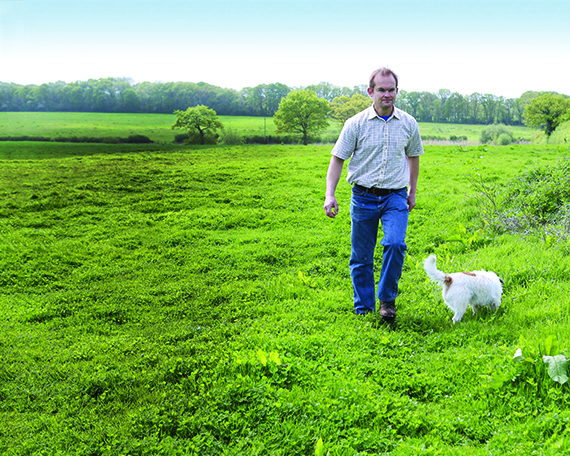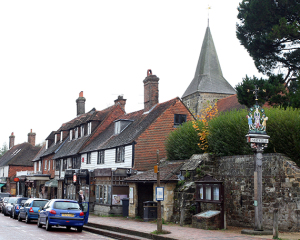
When Sussex farmer Robert Worsley (pictured) turned down an offer to buy his land for housing development he walked away from a reputed £275m.
The offer in May – from developer Mayfield Towns – would have seen his 550-acre farm in Twineham change hands at £2m an acre, roughly 10 times the market value for greenfield residential land in the area, and would have seen 10,000 new homes built.
To put it another way, the price was about 100 times the agricultural land value, and a staggering 273 times the average value of English farmland, as assessed by Knight Frank. However you measure it, this was serious money.
Turning down such a king’s ransom naturally raised eyebrows. The fraught local political context helps to explain the decision – but it also highlights the reluctance of some rural landowners to sell for development.
Townies tend to assume farmers are dazzled by pound signs and cannot wait to sell. But the sometimes pre-modern attitudes and non-monetary dynamics of rural landownership combine with canny negotiating tactics to make a refusal more common than might be expected.
The cultural atmosphere is the hardest for some potential buyers to grasp. In rural England land is adhesive – it stays with its owners – and trading is rare. Land is for buying, not for selling, and only death, divorce, debt or retirement usually forces a sale. Sales, when they happen, are almost always seen as a defeat.
Landowners pride themselves on being guardians of the countryside, even if their local critics do not see it quite the same way.
“Given the opportunity, many of us would enjoy living in beautiful countryside, looking out on to land we own. Farmers are no different.”
The prevailing attitude is well summed up by one farmer in the west of England. Speaking casually to EG about his forthcoming retirement from 200 acres of mixed farmland, he explained how cash value did not bear on his decision about the future of the land. “The highest offer came from a neighbour, but he has thousands of acres already and only has daughters. And another lower offer from a family with sons. So I sold to the family with sons,” he said.
The farmer’s concern was that land should not fall into uncaring corporate hands – although the method he had chosen and the language he used suggested some other prejudices might be at work. Confronted with old-fashioned values, some contemporary property developers will inevitably have a hard time negotiating with rural landowners.
Helen Ryan, agricultural associate at North West law firm Brabners, can understand that some landowners are reluctant to sell. She says: “Developers often don’t understand why someone would not realise a substantial capital asset. Many farms are still owned by individuals – frequently the land will have been owned by previous generations. There can be enormous reluctance to sell the family silver.
“Given the opportunity, many of us would enjoy living in beautiful countryside, looking out on to land we own. Farmers are no different. If they are happy where they are, and under no pressure from the bank, there may be no immediate incentive to sell.”
However, Ryan warns: “Farmers can and do change their mind about this – especially if the proposed development affects the furthest corner of the farm, as opposed to being visible from the kitchen window. But they can’t be pushed.”
Brian Buckingham is an old hand at negotiations with apparently reluctant rural landowners. The Cambridge-based head of rural residential development at Bidwells understands those negotiations – and the stakes.
“Most landowners want to try for development, and given the uplift in land value, why not. Land with planning permission is 10 times more valuable that a field full of wheat,” he says.
So is resistance to sale often just a negotiating tactic? “Oh yes,” he says. “You get hesitations from long-term landowners – the colleges, trusts, big families – because if they don’t get the right price today they will wait 20 years, or until the next generation. They are in no hurry to sell, and it’s a tool to up the price. It’s a classic move – you get a better deal if you seem reluctant to sell.”
“Most landowners want to try for development, and given the uplift in land value, why not. Land with planning permission is 10 times more valuable.”
Buckingham says that farmers often behave in “suboptimal commercial ways” by sacrificing value to retain woodland, or fields that have been in the family for centuries, or protected views. And they can sometimes persuade themselves to sell land if they rationalise it as an opportunity to buy land.
This intellectual sleight-of-hand works like this, Buckingham explains: “If they sell 10 acres for housing, they could probably afford to buy another 100 for farming. So they rationalise the sale as an opportunity to buy and, with rollover tax relief available, the tax regime encourages them to do that. It is very tax efficient to spend revenue from land sales on acquiring new land – and it’s a very helpful fact for persuading landowners to sell.”
But there remains an essential difference of outlook between traditional landowners and modern developers. Buckingham says: “Landowners take the long view, house builders the short view of profit and loss over three or four years. This conflict is interesting when you come to negotiating the price.”
Price is, ultimately, what this is all about. Forget the cultural dynamics of rural landownership, forget the adhesiveness of farming estate formation. It all comes down to money.
Edward Heaton, from Heaton & Partners search agency, says: “In reality, most people have their price and farmers are no exception to this. So long as the deal is right, then it is rare for a farmer to take such a stance as Robert Worsley. The sums involved can be so life-changing that ultimately few would walk away from such riches.”
If they did, well, there is always a chance to unstitch the deal later. As Heaton points out, there is rarely an outright purchase of land unless it has been specifically identified for development. Options, promotion agreements and joint ventures can all be reversed.
Rural land is not like normal land. It is not bought and sold in the same atmosphere, nor for the same reasons. And residential developers who cannot grasp that could come unstuck – sooner, or much, much later.

Mayfield’s Sussex new town
Mayfield Market Towns is planning a 10,000-home new town on the site of Robert Worsley’s farm near Haywards Heath.
Worsley, who has owned his farm for 15 years, has said he did not want to see Sussex ruined. It is believed that around 200 landowners, holding between them 4,300 acres, have also said they will not sell.
The campaign is co-ordinated by Locals Against Mayfield Building Sprawl, which has the support of local MPs Sir Nicholas Soames and Nick Herbert.
Mayfield is led by Argent founder Peter Freeman.











